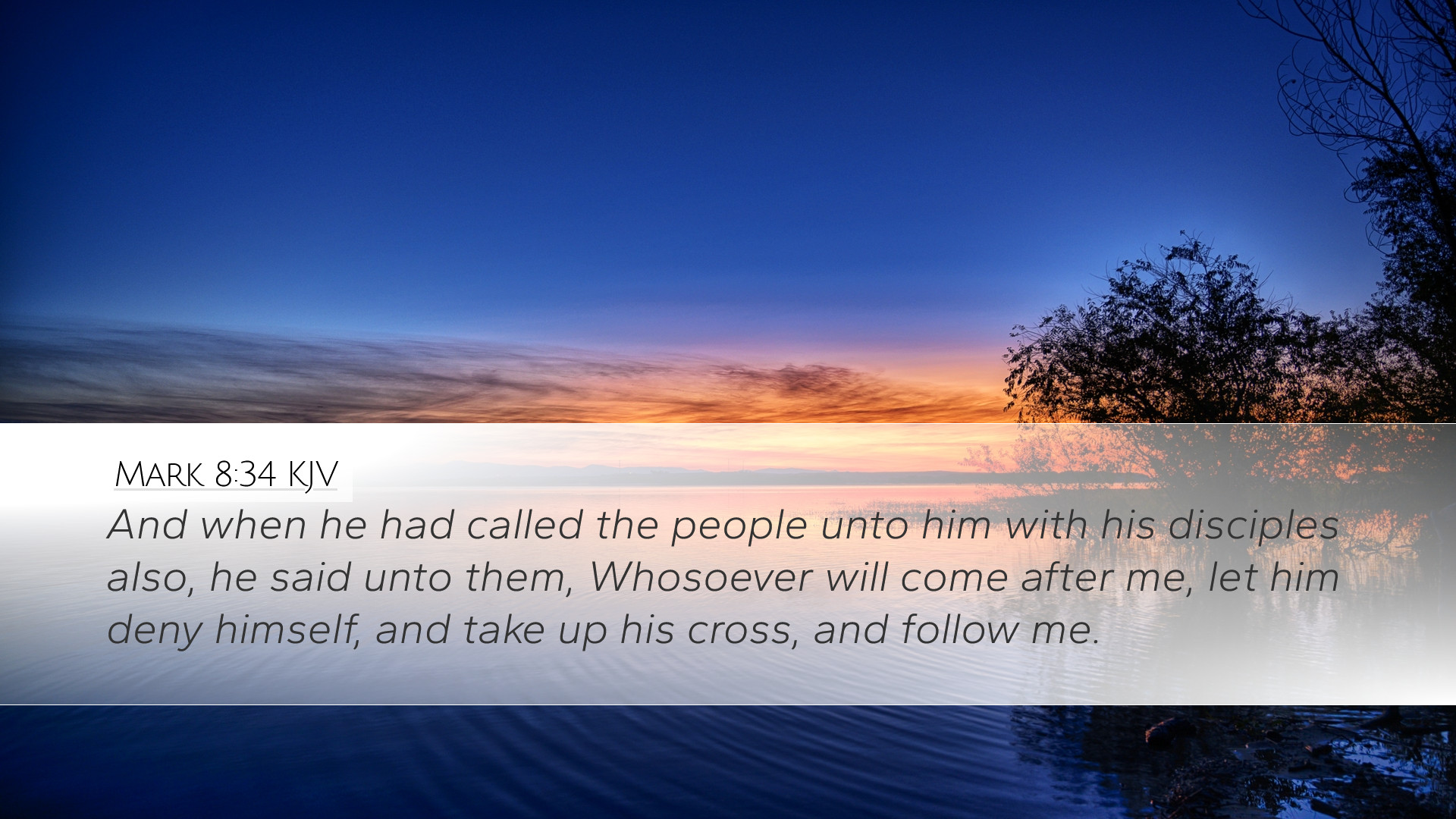Commentary on Mark 8:34
Verse Text: "And when he had called the people unto him with his disciples also, he said unto them, Whosoever will come after me, let him deny himself, and take up his cross, and follow me." (Mark 8:34)
Introduction
The words of Christ in Mark 8:34 are profound and foundational for the Christian life. This verse encapsulates the essence of discipleship and provides a roadmap for believers who seek to follow Jesus. In this commentary, we will explore the theological depth, practical applications, and implications of self-denial, cross-bearing, and the call to discipleship as understood by respected commentators like Matthew Henry, Albert Barnes, and Adam Clarke.
Contextual Analysis
In the broader narrative of the Gospel of Mark, Jesus has just predicted His passion (Mark 8:31), expressing the necessity of His suffering, death, and resurrection. This sets the stage for his call to discipleship—a participatory sharing in His sufferings. Henry notes the contrast between worldly ambition and the Kingdom’s radical call, prompting believers to reevaluate their priorities in light of eternity.
The Call to Discipleship
Jesus begins by calling the people and His disciples, indicating that this teaching is crucial for all who would follow Him. Henry points out that Jesus does not offer an easy path but rather sets the expectation that following Him will require personal sacrifice.
Denying Oneself
"Let him deny himself" is the first condition of discipleship. Barnes emphasizes that self-denial involves a conscious rejection of self-interest and the pursuit of worldly pleasures. This denial is rooted in love for Christ, leading to a transformation of desires and ambitions.
- Matthew Henry argues that true self-denial is not merely the denial of sinful pleasures but extends to the renunciation of all that hinders one’s relationship with God.
- Adam Clarke elaborates that this denial is a profound commitment to prioritize the will of God over personal ambitions, reflecting a heart aligned with divine purposes.
The Cross-Bearing Motif
"Take up his cross" adds a layer of significance and suffering to the discipleship call. Clarke interprets the 'cross' metaphorically, suggesting that it represents the burdens, trials, and tribulations that every follower of Christ must endure. This imagery resonates deeply with the historical context in which the Gospel was written, where crucifixion was a common punishment for criminals. This vivid imagery invites the believer to bear their trials with courage and faith.
- Henry posits that this call implies readiness to endure shame and persecution for the sake of Christ's name, highlighting that obedience may come at a personal cost.
- Barnes emphasizes that taking up one’s cross also symbolizes a total commitment to Christ, akin to the willingness to die for one's faith, mirroring Christ's own sacrifice.
Following Christ
The final exhortation is to "follow me." This is both an encouragement and a directive, suggesting an active and ongoing relationship with Jesus. Henry remarks that this call to follow emphasizes fidelity and loyalty amidst adversity, urging believers not only to accompany Jesus in His earthly ministry but also to imitate His character and mission.
Clarke shares that following Jesus involves adhering to His teachings and example, underscoring the necessity of daily engagement with the Scriptures and prayer. The act of following requires vigilance, as illustrated by the disciples' struggles, reminding us that perseverance is key in our spiritual journey.
Theological Implications
The call to discipleship articulated in Mark 8:34 serves as a lens for understanding several important theological principles:
- Suffering and Glory: The universal theme of suffering preceding glory is evident in Jesus’ life and the call to His followers; embracing the cross leads to resurrection life (Romans 8:17).
- The Cost of Discipleship: This passage starkly contrasts the comfort-seeking approach prevalent in contemporary theology and the demand for total surrender to Christ.
- Radical Love: Discipleship entails loving Christ above all else, emphasizing that genuine love necessitates sacrifices and choices that reflect His priorities.
Practical Applications for Today
This verse's challenge is relevant for pastors, students, theologians, and scholars in their pursuit of faithfulness. In practical terms, the application of Mark 8:34 might be summarized as follows:
- Invite Self-Examination: Encourage personal reflection on what it means to deny oneself in a consumer-driven society.
- Promote Community:** Create supportive communities that nurture and share in the burdens of cross-bearing.
- Teach on Suffering: Prepare the church for the reality of suffering as an integral part of the Christian experience.
- Encourage Imitation: Cultivate an environment where believers can follow Christ together, growing in character and mission.
Conclusion
Mark 8:34 encapsulates the essence of what it means to be a disciple of Christ: self-denial, cross-bearing, and following Jesus. As we engage with this call, let us heed the insights of respected commentators, integrating their wisdom into our preaching, teaching, and daily living. In doing so, we honor the profound cost of our discipleship while embracing the incredible grace and hope found in Christ.


